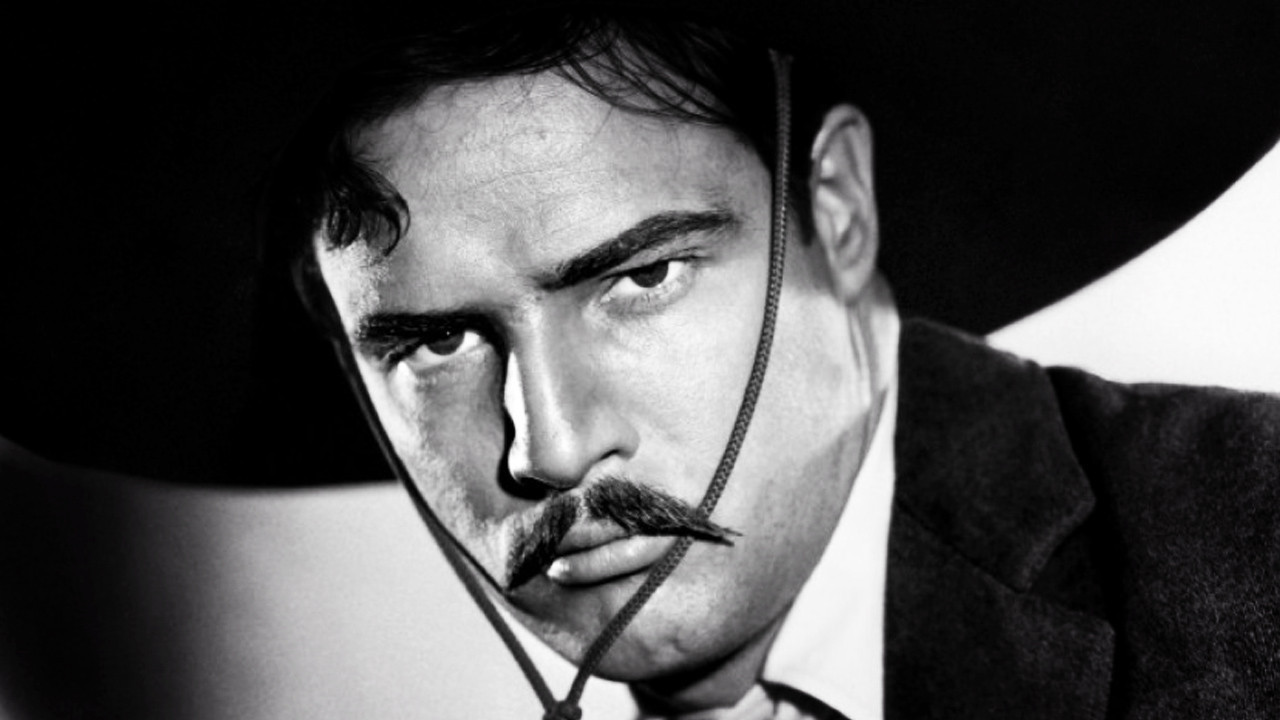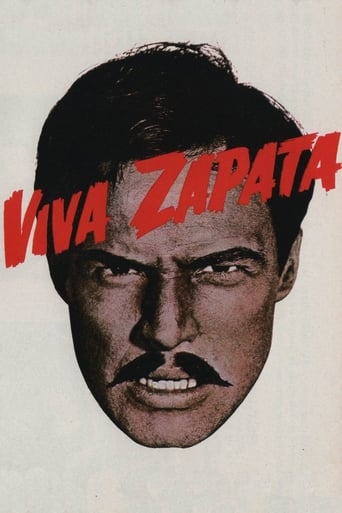Doomtomylo
a film so unique, intoxicating and bizarre that it not only demands another viewing, but is also forgivable as a satirical comedy where the jokes eventually take the back seat.
Voxitype
Good films always raise compelling questions, whether the format is fiction or documentary fact.
Salubfoto
It's an amazing and heartbreaking story.
Logan
By the time the dramatic fireworks start popping off, each one feels earned.
tomsview
I've always loved the look of this film and assumed it was filmed in Mexico. After reading Elia Kazan's autobiography, "Elia Kazan: A Life", I now know it wasn't and the reason why.Kazan and John Steinbeck, who did the screenplay, originally wanted to film it there, but the Mexicans wanted to make their own film of their hero, and made it pretty well impossible for the Hollywood production to be made there. It was eventually shot close to the Mexican border, but in the U.S.A.I see in some places where it's claimed that Kazan was influenced by Roberto Rossellini's "Paisan". Maybe so, but I think a bigger influence was John Ford. Just look at the way the landscape is used and the way the action is handled: the horses and the dust. In his book, if Kazan mentioned any director he admired it was John Ford.He knew Ford, and although they certainly weren't buddies, Kazan was impressed with his work. He also learned from Ford not to be too much of a nice guy if he wanted to make films his own way. Ford's "The Fugitive" made 4-years before and filmed in Mexico, would have to have been an influence.Although Kazan's early films were studio-bound, he was determined to shoot future films on location. They were tough projects, but from "Viva Zapata!" on they had a unique visual style. Kazan led from the front; he inspired his crews by enduring the same conditions they did; the results speak for themselves.Kazan could always get the best out of actors and Brando and Quinn brought a lot to the film. However, there are dull spots, the courting scenes with Josefa's father almost seem as though Kazan was trying to do for the Mexicans what Ford did for the Irish. However the longueurs are outweighed by one brilliant sequence after another, and Alex North contributed a powerful score steeped in Mexican music.Kazan had joined the communist party back in his Group Theatre days, but quit shortly after - he resented the heavy-handed influence of the party on their work. Some of his feelings about the demagogues he encountered seem reflected in Joseph Wiseman's character.It is easy to find subtext here, but "Viva Zapata!" is a fair retelling of complex history. That aside though, it still comes across as a visually powerful and heartfelt film.
grantss
Mexico, 1909. The people in the state of Morelos rise up against the tyrannical regime of President Porfirio Diaz. They are lead by a simple, illiterate peasant-farmer, Emilio Zapata. All he wants is justice and fairness for his people but as things progress he is drawn deeper into a civil war where allies and enemies are often difficult to tell apart.Written by John Steinbeck, directed by Elia Kazan, starring Marlon Brando and Anthony Quinn, and based on a true story, on paper this has all the makings of a classic. The end result, however, is far from satisfactory.The intention was good: show the life of a man of integrity and honour and the lengths he is willing to go to for the rights of his people, throw in a theme of how power corrupts, plus another theme of how a name can sustain a revolution. Can't fault the performances either. Brando, in his third movie, puts in a strong performance as Zapata. The movie provided him with his second Oscar nomination, after only three movies (his first was in A Streetcar Named Desire, his second movie). Anthony Quinn won the Best Supporting Actor Oscar in 1953 for his portrayal of Eufemio, Zapata's brother.No, it is in the execution, especially direction and editing, that things fall a bit short of their potential. The story is clumsily told by Elia Kazan. Scenes don't link well, some scenes seem entirely unnecessary and it is difficult to follow the history behind the sequence of events. No explanation is given for the seeming lack of continuity, eg Zapata is President, all seems well, then next we know it is back to civil war with Zapata a revolutionary. No detail for the change provided.This sudden change of direction, without the events that changed the direction, is incredibly jarring and disconcerting.So, in the end, you have a historic story with many of the historic details left out. Not ideal.Overall, okay, but not great. While Elia Kazan was a great director, I can't help but think this movie would have been a masterpiece if someone like John Huston, or maybe John Ford, had directed it.
elvircorhodzic
VIVA ZAPATA! is a film that brings the spirit of wild and hungry peasants revolt in the south of Mexico. The story follows a rebel Emiliano Zapata and his peasant life from childhood, through periods of glory and power to his death. The main protagonist is a man of wild passion that is dedicated to fighting for the rights of the poor and oppressed. Despite noticeable firmness and stubbornness, the figure of the main character is a rather romanticized and dedicated to the eternal struggle for freedom.The atmosphere in the film really is reminiscent of the contours of the revolution, including the powerful, almost historical moments and consequences. The dynamics is of the top, so I have to say that this film is pretty exciting. The focus of this drama is placed on social injustice, imbalance and savagery as a kind of form of primitivism. I think this movie not only shows the life of a rebel and the people around him, but unwillingness to arranging state leading to permanent tragic consequences. The director tried to make it more realistic picture. In the film there are "separate" scenes where you can see the brutal killing of hungry peasants in the fertile cornfields, murder, anxiety and rebellion on the dusty streets ... etc. The highlight of drama is tragic frustration of a man who out of ignorance or impatience can help your neighbor in the right way. Marlon Brando as Emiliano Zapata He seems a little lost. His character does not change. His jokes and outbursts of love sometimes act inappropriately. I have the impression that Mr. Brando wanted the film finish as soon as possible. However, its wild and natural acting left a strong stamp. Anthony Quinn as Eufemio Zapata was in one emotional performance left much better impression. A man of flesh and blood. His character knows exactly what all the fighting.Other actors are pretty solid. Joseph Wiseman as Fernando Aguirre He is insensitive, dark and power hungry. Lou Gilbert as Pablo He is adaptable companion, the only character who understood the essence. Jean Peters as Josefa Zapata is a strong female character, a real lady who was unsuccessfully trying to come to grips with the wilderness in her husband.I have the impression that the story in this film remained sketchy. The battle continues without the hero, and he will remain in the hearts of those who love him.
nandy-rinki
I wonder how one of the reviewers found Brando a miscast, Brando is brilliant in the movie. With his intense anger and hatred for the exploiters and supported by good looks his performance is quite impressive. Kazan is a genius with his direction, all the main actors are superb starting from Brando, Quinn and the bad guy. I can't imagine why 'they' gave the Oscar to Gray Cooper for High Noon when Brando's performance in Viva Zapata clearly outdid Gary's, I have seen both the movies and Brando deserves it without a second thought. Well, Brando didn't care and that's the best part, he certainly is the BEST in method acting and this movie shows just how talented and gifted as an actor he was. The movie overall is a classic, poetic, rebellious and based on the life of the revolutionary Zapata in Mexico. There are a number a similarities with Che Guevara, war tactics and the way he lives and spares no one when it comes to his ideals. It's must watch for the lovers of classic, artistic cinema.

